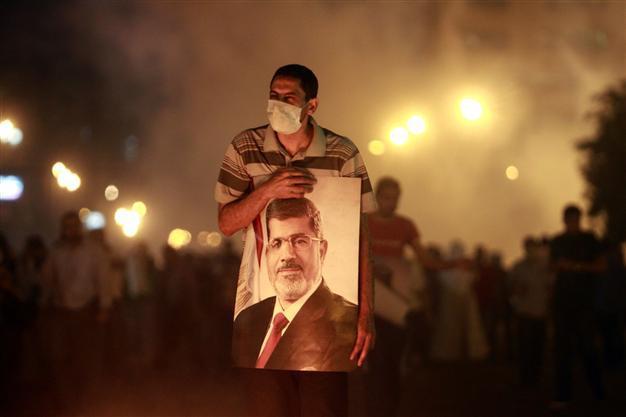Islamist parties boycott interim gov’t in Egypt
CAIRO

An injured supporter of deposed Egyptian President Mohamed Mursi carries a poster of Mursi . REUTERS Photo
Egypt’s powerful Islamist groups, the Muslim Brotherhood and the Salafi al-Nour party, have boycotted the country’s first interim government which was sworn in late July 16, as thousands of supporters of ousted President Mohamed Morsi demonstrated outside the prime minister’s office to protest the interim government.The interim Cabinet consists of 35 ministers, mostly technocrats and liberals as no one was picked from the two main Islamist factions that won five straight elections since a 2011 uprising toppled Hosni Mubarak. The interim president’s spokesman had earlier said posts would be offered to the Muslim Brotherhood, but the group promptly refused, saying it would not take part in the military-backed political process and would continue protests until the legitimately elected Morsi is reinstated.
The brotherhood said it had called a new round of pro-Morsi protests in the capital later on July 17.
“We don’t recognize its legitimacy or its authority,” brotherhood spokesman Gehad El-Haddad told Agence France-Presse.
“Does it believe in itself? Does anybody?” Essam El-Erian, a senior leader in the brotherhood, said on Facebook of the new Cabinet. “How can it have any authority when it knows that with one word from the military all its members can be sent home on pain of being arrested?”
Salafis also criticized the leadership as “biased,” lacking inclusion and repeating “the same mistake the last government was blamed for.” Sworn in by interim President Adly Mansour, it reflected the largely liberal, secular bent of the factions who brought millions into the streets at the end of June.
Women have a somewhat higher profile in the government, with three ministries – including the powerful information and health ministries. Most past governments for decades have had at most only two women. The Cabinet also includes three Christians, including one of the three women, Environment Minister Laila Rashed Iskander. That is also a first, since successive governments had no more than one or two Christians.
Interior Minister Mohammed Ibrahim, appointed by Morsi, remains in his post, which oversees the police. Nabil Fahmy, who was Egypt’s ambassador to the U.S. from 1999 to 2008 and a nuclear disarmament expert, becomes foreign minister. In a nod to the revolutionary youth groups that engineered the 2011 uprising and this year’s massive protests, Mansour renamed the Justice portfolio the Transitional Justice and National Reconciliation Ministry and gave it to Mohammed el-Mahdi, a career judge.
Thousands of Morsi supporters demonstrated outside the prime minister’s office in a “day of steadfastness” to protest against the formation of the new interim Cabinet on its first day on the job.
Protesters held up Qurans and portraits of Morsi in the blistering noon heat outside the main government buildings in the center of Cairo, demanding Morsi be restored to power. They shouted “God is Greatest!” and “Down with military rule!”
“We have only two goals, legitimacy or martyrdom,” said Ahmed Ouda, 27. Another man interrupted to add: “Peaceful martyrdom!”
The crisis in Egypt, which straddles the Suez Canal and has a peace treaty with Israel, has alarmed its allies in the West and the region. Catherine Ashton, the European Union’s foreign policy chief, flew to Cairo yesterday, the latest international figure to meet Egypt’s interim rulers.
Ashton met Mansour, Prime Minister Hazem Beblawi, Fahmy and Army Chief Gen. Abdel Fattah al-Sisi, the general behind the coup that overthrew Morsi on July 3.
“I am going to Egypt to reinforce our message that there must be a fully inclusive political process, taking in all groups which support democracy,” Ashton said before arriving. Unlike a U.S. envoy who came two days ago, she is also expected to meet senior figures in the Brotherhood.
















